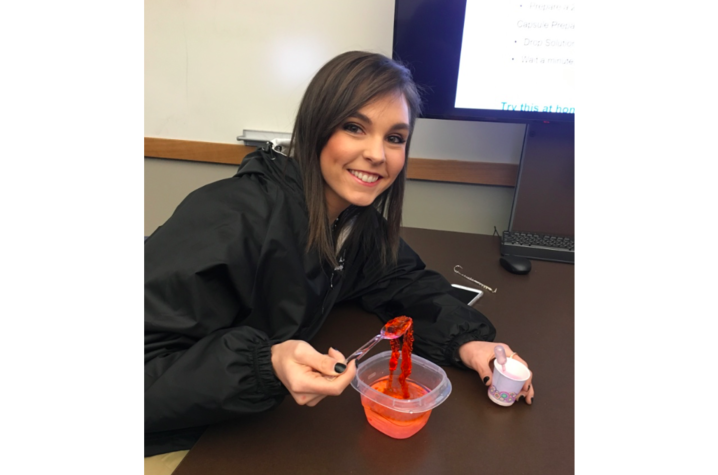UK Students, Faculty Encourage Middle School Girls to 'Expand Their Horizons'
LEXINGTON, Ky. (April 25, 2017) — Research in science and math education tells us that as early as elementary school, girls begin to feel alienated and insecure about the subjects. As a result, a statistically low number of women choose to study or enter career fields in the areas of science, technology, engineering and mathematics (also known as the STEM fields).
To address these insecurities, a team of faculty, staff and students at the University of Kentucky will host "Expanding Your Horizons" this Saturday, April 29 — a conference that encourages middle school girls to consider STEM studies. Between 100-150 girls from around Kentucky are expected to attend, along with their parents, and will participate in interactive workshop experiences, meet female role models in STEM fields and learn about different career opportunities.
“I hope this will be a fun, encouraging and eye-opening experience for the middle schoolers,” said Ellen Crocker, a postdoctoral fellow in the UK College of Agriculture, Food and Environment and leader of the conference. “The workshops we have scheduled will give them a tiny taste of a great diversity of STEM topics and provide visible role models of young women studying STEM.”
Expanding Your Horizons, or EYH, is being funded by a grant from the Kentucky NSF EPSCoR (National Science Foundation Experimental Program to Stimulate Competitive Research) for Education and Outreach Activities. The EYH organization reaches approximately 24,000 girls per year through its one-day conferences and hands-on STEM activities, but this will be the first conference hosted in Kentucky.
“Discussions with other STEM conferences serving Kentucky’s middle school girls indicate that this is an underserved audience with great potential for growth,” said Susan Odom, assistant professor of chemistry in the UK College of Arts and Sciences and one of the event's organizers. “Consistent with the EYH mission, our goal is to inspire girls to recognize their potential and pursue opportunities in STEM. Through EYH, we have support that would not be possible through a completely independent program, and have guidance from scientists and educators who have set up similar activities.”
Workshops will include activities like creating soap from soybeans, measuring bacteria on phones and other surfaces and studying the electrical activity in muscles during exercise. Approximately 50 UK undergraduate and graduate students are volunteering as workshop leaders, and will receive course credit for their work. Over 20 additional students will serve as chaperones and station leaders.
Brittany Rice, a first-year doctoral student in the UK Department of Integrated Biomedical Sciences, is leading a workshop called “Bacteria’s Most Wanted,” which will teach the girls how to identify different types of bacteria using mugshots, clues and special laboratory equipment. Rice has a passion for improving people’s quality of life through biomedical research, and a passion for outreach as well.
“The merging of my interests in science, education and outreach has led me to seek many volunteer opportunities where I am able to encourage and motivate the future generation of STEM, and enlighten those who are not familiar with STEM about its efforts, research and impact in our daily lives,” Rice said. “I did not participate in any experiences like EYH when I was younger — at that time there were no known experiences like EYH for girls. I am more than elated that this generation of ladies has opportunities that stimulate interest in STEM!”
Elena Manauis, a pre-pharmacy freshman studying agricultural and medical biotechnology, is also a student workshop leader. She had the opportunity to attend a conference like EYH at a community college when she was in middle school and said it was what inspired her to go into pharmacy.
“People always thought I was crazy for knowing what I wanted to do at such an early age (even now I get similar reactions from some of my peers),” Manauis said. “But I sincerely owe my decision making to that introductory conference. It has impacted my life greatly. I wanted the opportunity to empower younger girls and to introduce them to all of the incredible opportunities that the STEM fields have to offer. I hope that we can lead by example and really encourage them to pursue a career in science.”
EYH will also offer workshops for the girls’ parents that will address potential gender biases they may unintentionally hold.
“Giving middle school girls exposure to a university setting would be a disservice if we did not include parent participation and education, because of the strong effect parent socialization has on the preferences for children to pursue certain activities,” Odom said. “We are focusing equally on parent training to help parents avoid unfounded biases and discouraging behavior for their daughters interested in STEM activities, as messages parents send are likely to affect a child’s motivation for pursuing activities in the short run.”
As a doctoral student at Cornell University, Crocker participated in an EYH conference as a workshop leader, just like the UK student volunteers are doing this Saturday. She said that experience taught her not only about the importance of outreach, but the value in communicating and engaging with others about science.
“One of the reasons I was excited to bring EYH to UK was to enable UK students to build science communication skills,” Crocker said. “I am passionate about public engagement in science and as a graduate student EYH helped me cultivate this skill set that I use all the time working with UK's Cooperative Extension Forestry group. It is essential that scientists effectively communicate their research.”
EYH will take place Saturday, April 29, in the Jacobs Science Building.
“Hopefully this will encourage the middle schoolers to visualize their own academic potential. They could be in the shoes of the workshop leaders, studying at UK, in just a few short years,” Crocker said. “I hope that this conference helps to make higher education (and STEM in particular) seem more accessible to the young women who attend.”






